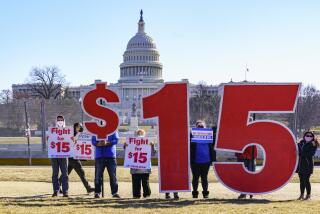Solutions to Gap
- Share via
John Lawrence (“Society May Pay as Income Gap Widens,” Aug. 3) and David M. Gordon (“Concentrated Wealth Poses Threat,” Aug. 5), are concerned with the income gap. Unfortunately, they offer no solution. There are relatively simple solutions, however, to this problem and to the problem of stimulating the economy.
Increased consumption is the only true stimulant to the economy, not tax preference gimmicks to encourage investments. In World War II, industry expanded happily to meet demand despite a 90% excess profits tax.
In peacetime, the best way to increase consumption is to increase the pay of the lowest paid workers. They put all of their money into consumption.
The federal government, however, has not allowed the minimum wage to increase in any reasonable relation to the cost of living. The minimum wage was $3.10 per hour from 1977 to 1981 and $3.35 per hour from 1981 to the present--a 25-cent-per-hour increase in nine years!
The philosophy that a low minimum wage gives marginal workers a job is simply not true. Businesses hire people at the lowest competitive wage when they need them. The minimum wage should be increased 50 or 60 cents per hour immediately and reviewed and increased yearly after that.
The second program would be to install a minimum of a 90% excess income tax on all “adjusted yearly gross income” in excess of $1 million. The myth that a limit on income would inhibit the entrepreneurial spirit in the United States is false. Super-high pay is just an ego trip for actors, athletes and businessmen wanting to top their peers--not an economic necessity. The “super rich” who have inherited their wealth would have to spread the wealth to other family members, charity or government taxes.
The two programs would slow down the growth of the income gap, stimulate the economy and increase revenue to the government to enable it to reduce the federal debt.
WILLIAM T. BOX
Gardena
More to Read
Inside the business of entertainment
The Wide Shot brings you news, analysis and insights on everything from streaming wars to production — and what it all means for the future.
You may occasionally receive promotional content from the Los Angeles Times.










